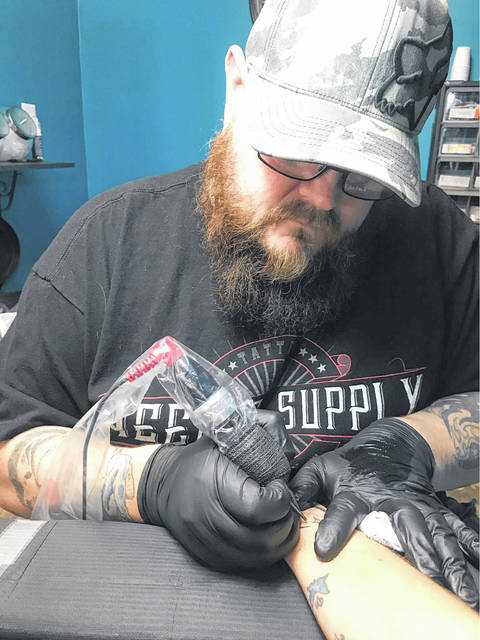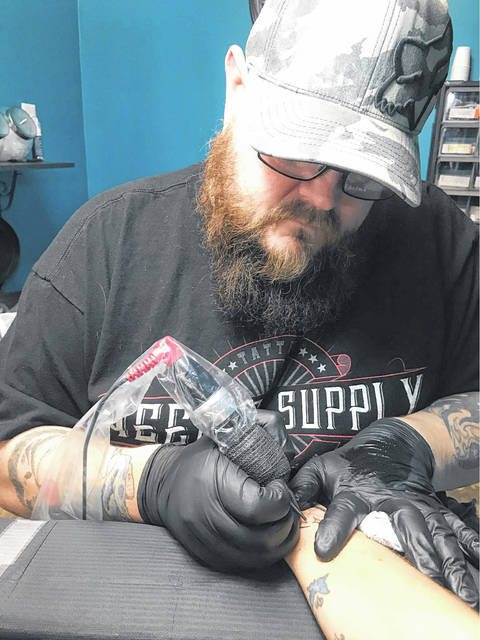

As Ohio officials finalize plans to reopen the state, tattoo artists are concerned they’ve been left out of the conversation.
Brian Lansing, who owns Olde Town Ink in Hillsboro, pointed out that tattoo shops were initially closed with Ohio salons.
“On the 15th, they’re opening up the salons and spas and all that but left out the tattoo parlors. They’re putting us in a category with campgrounds, pool halls — recreational-type stuff. I don’t get it at all,” Lansing said. “We’ve got training on blood-borne pathogens, CPR, first aid, cross-contamination; we wear gloves, have sinks in our rooms, use hand sanitizer constantly. We only have one client in a chair at a time. We’re appointment-based, so it’s not like we have a big group of people sitting in there. And they just hold us off. They’re opening on the 15th, and the tattoo industry’s at a standstill.”
The State of Ohio also requires tattoo artists to be licensed by the board of health.
Bilancia Tattooing and Permanent Makeup owner Heidi Lail, whose shop is located in Hillsboro, and Black Cat Tattoo owner Krista Kerr, located in Greenfield, also expressed exasperation.
“I’m the only artist in my studio, and I work by appointment only,” Lail said. “We already use universal precautions when we work, and with the addition of masks and limiting the number of people in the studio at a time, I don’t see how we are any more dangerous than the salons are. I already use hospital-grade disinfectants to sanitize my studio in between clients. I will follow any additional guidelines I am given by the state when I am allowed to reopen.”
Kerr, Lail, and Lansing each indicated they’re concerned by that, though Ohio Governor Mike DeWine has advisory groups with representatives from salons and similar industries to help inform reopening decisions, no tattoo artists or tattoo parlor owners are part of current advisory groups.
“This whole situation has been a bit surreal,” Lail said. “I’ve worked since I was 16 years old and supported myself since 18. Now, to be told I’m ‘not essential’ and not allowed to work is disheartening and frustrating.”
Kerr said, “We may not be essential to some people, but to me, it’s essential because that’s how I pay my bills. For shopkeepers who have multiple artists, that’s how they take care of their artists. That’s how their artists feed their families. You think about somebody opening their business and then having that business taken away from them like this — what’s that going to do to them?”
Kerr, Lail, and Lansing each stopped taking new appointments once the shutdown began. At that time, each was scheduling appointments at least two months out.
“There was no warning. It was put up that day that we were done at 9 p.m. There was no time to prepare customers,” Kerr said. “With this being our busiest time, I’m still having people on the books who have to be canceled.”
Though some clients have paid for work they have scheduled or, in Kerr’s case, bought gift certificates during the shutdown, Kerr and Lansing said they’re concerned clients who already had appointments may not be able to afford tattoos after losing their jobs.
For Kerr, Lail and Lansing, their shops are their primary or only source of income.
In Lail’s case, her boyfriend, who owns Hillsboro Fit Club, also had to close his gym, and the couple’s band, Missing November, has lost opportunities to play as well. Lail said they will more than likely also have to cancel their “Music on Main” music festival.
Although government entities and organizations have offered grants and loans for small businesses during the shutdown, Kerr said it’s not enough.
“Another thing they promised was, ‘Close your shop. We’ll be there for you. We’re going to get unemployment for you. There are grants and loans you can get,’” Kerr said. “I am fortunate. I did get both an SBA (Small Business Association) grant and a PPP (Paycheck Protection Program) loan. I just got the PPP loan on May 5. So I went from March 18 to May 5 with absolutely no help whatsoever. I think I got the grant about a week ago.”
Even though she did receive assistance, Kerr said there’s still uncertainty.
“What’s scary about this: there was just a deposit in my account. I’ve gotten no paperwork from them. The money’s there, but I’m kind of afraid to spend it. I don’t know the terms,” Kerr said. “I went through a bank for the PPP loan, and the banker had a little bit of knowledge, but even he said he doesn’t know for sure. He thinks I will probably have to pay a portion of that back, but he doesn’t know how much or the interest rate.”
Kerr isn’t the only shop owner who has struggled with financial assistance. Lansing applied for as much financial assistance as he could, but he ultimately received only a partial award of $1,200.
“You make that in around two days, and they want that to last for a month,” Lansing said. “It just doesn’t work out when you’re paying double the bills. All that does is cover the rent at the parlor and my house payment. It’s been tough.”
All three shop owners are ready to reopen. On top of their normal precautions against diseases like HIV, they’re taking additional precautions against COVID-19.
“I’ve been trying to see what other states are putting in place, just trying to think, ‘What are they going to spring on me at the last minute that I have to have before I can open?’” Kerr said.” I’ve ordered face masks, forehead thermometers, face shields. I had arm covers already. I ordered the thermometer at probably the beginning of April. I don’t have it yet. They’re telling me I could have it between May 8 and June 8.”
Kerr plans to take each client’s temperature before tattooing them to minimize further COVID-19 spread. Lansing said he’s already stocked up on masks.
In March, Kerr was supposed to celebrate her Greenfield shop’s second anniversary, but since the closure, she’s considering celebrating in October instead.
“Just opening back up would be a great celebration,” Kerr said.
According to Lansing, some Ohio tattoo artists are planning to protest in Columbus in an attempt to fight the decision to keep tattoo parlors closed. These artists plan to wear masks and follow other guidelines during the protest, Lansing said.
Ohio’s tattoo artists are asking Ohioans to call the Ohio Department of Health at 833-427-5634 to protest.
Bilancia Tattooing and Permanent Makeup, located in Hillsboro, can be found on Facebook. Once she finishes rescheduled appointments, owner Heidi Lail will begin taking new appointments. The best way to reach her is through Facebook or at [email protected].
Black Cat Tattoo, located in Greenfield, can be found on Facebook. Owner Krista Kerr is also selling what she referred to as creepy doll head art on her personal Facebook. She’s also selling tattoo gift certificates. She’ll begin taking new appointments after she completes rescheduled appointments.
Olde Town Ink, located in Hillsboro, can be found on Facebook. Owner Brian Lansing hopes tattoo shops will be able to open by June 1.
Reach McKenzie Caldwell at 937-402-2570


